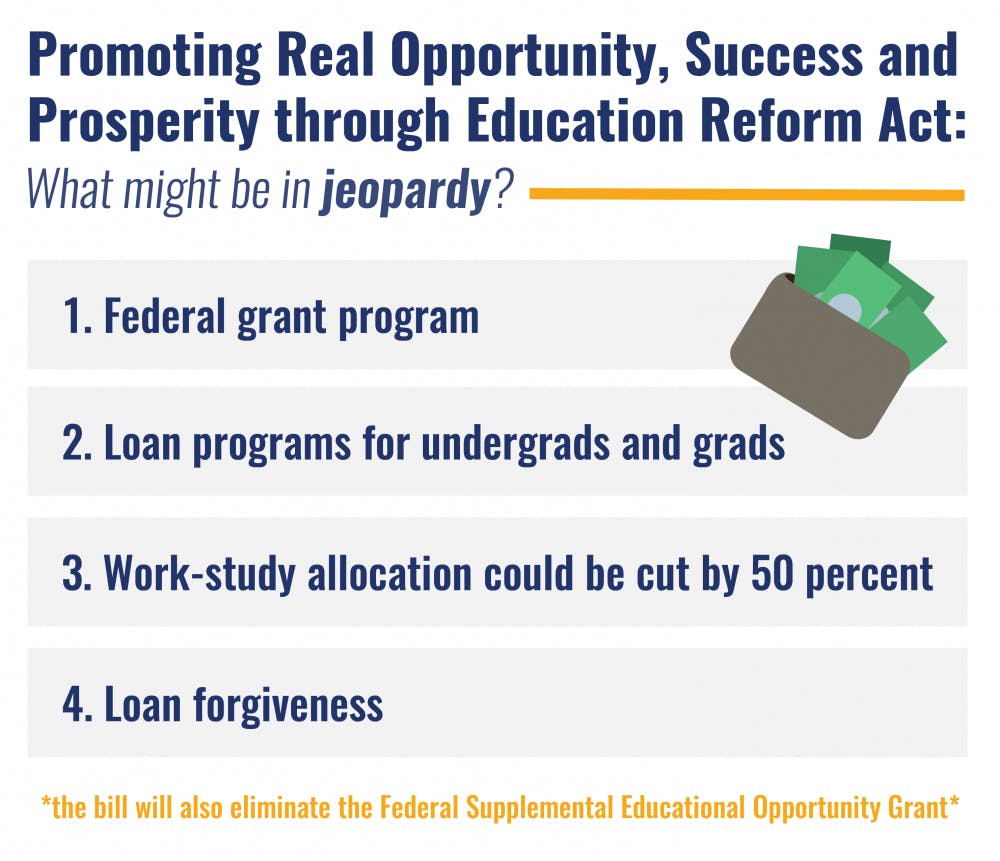
A proposed Republican higher education bill that aims to change the way students pay for college will have negative impacts for Penn, according to Penn officials and student leaders.
The Promoting Real Opportunity, Success, and Prosperity through Education Reform Act was written by two Republican congressmen and passed the House Committee on Education and the Workforce in December.

The proposal will negatively impact Penn's financial aid in a number of ways, according to University Director of Financial Aid Elaine Papas-Varas. Papas-Varas listed changes to the federal grant program, loan programs, work-study, and loan forgiveness as areas that could be affected.
To lobby against this plan, Papas-Varas attended a meeting of the Coalition of Higher Education Assistance Organizations and participated in 11 meetings with representatives of Congress and staffers from the Philadelphia area in Washington, D.C. at the end of January, according to Student Registration and Financial Services Communications Director Paul Richards.
Papas-Varas, along with COHEAO and Penn’s Office of Government and Community Affairs, developed “talking points to share with members and their staffs," Richards said.
A foremost concern for Papas-Varas is that the PROSPER proposal would eliminate the Federal Supplemental Educational Opportunity Grant fund, a grant for students with exceptional financial need.
“We have students here who certainly benefit by the FSEOG grant,” Papas-Varas said. “That would be one negative impact of the PROSPER Act to our students.”

Papas-Varas also said that loan programs would be cut for both undergraduate and graduate students. Undergraduates would see an elimination of subsidies and graduate students could be potentially limited in the amount they could borrow.
Penn students who participate in work-study positions would also be affected, according to Papas-Varas, as they could see work-study allocations cut by almost 50 percent.
Matt Sessa, executive director of SRFS, described the University’s lobbying effort as centered on “advocating and educating members of Congress.”
“While I understand the national concept for access and increasing the availability for undergraduates throughout the country, I’m speaking on behalf of our institution,” Papas-Varas said. “And for us to lose that benefit is significant in terms of our graduate students being able to work.”
According to Inside Higher Ed, this proposal is part of a push to shift funding from private universities in the Northeast to schools that don’t normally receive such funding, like community colleges or for-profit institutions. It would also focus on work-study programs that primarily serve undergraduates, harming universities like Penn.
Yet Sessa stressed the proposal was still in its early stages and the changes the PROSPER Act aims to implement are far from becoming law.
“It has a long way to go before it becomes actual law or statutes,” Sessa said. “It’s highly unlikely it gets enacted in its current form.”
In addition to official opposition from Penn, the PROSPER Act was also met with opposition from President of Penn Democrats and Wharton sophomore Dylan Milligan.
“This whole plan is screwing over students who are taking on debt to go to college by lessening the amount of federal support they can get,” Milligan said. “Overall, I’d say it’s a bad idea — the best investment the government can make is in education.”
The Daily Pennsylvanian is an independent, student-run newspaper. Please consider making a donation to support the coverage that shapes the University. Your generosity ensures a future of strong journalism at Penn.
Donate




